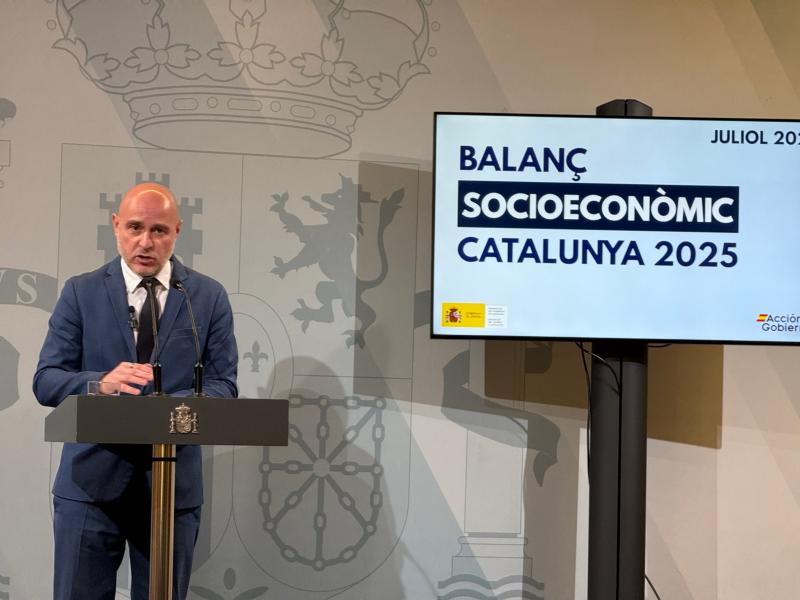· The government delegate assures that “Catalonia and Spain are better today than they were seven years ago thanks to the progressive government” and has stressed that the autonomous communities have received 300 billion euros more in seven years of government of Pedro Sánchez compared to the same period with Mariano Rajoy
· Catalonia has almost half a million more employed than in 2018, the retirement pension is, on average, 436€ higher and there are 143% more indefinite contracts
Barcelona, July 29, 2025 - The government delegate, Carlos Prieto, presented on Tuesday a balance sheet of socio-economic data in Catalonia at the end of the first half of this 2025. Prieto highlighted the firm commitment of the Executive of Pedro Sánchez to social policies and pointed out how these policies “and the action of the Government has a direct impact on the day-to-day of the whole of the citizenry.”
During his speech to the media, Prieto said that “Catalonia and Spain are better today than seven years ago thanks to the progressive government”. “The Government of Spain has complied with Catalonia and will continue to comply”. “Faced with the noise of the right and the far right, facts and data”, said the government delegate, who stressed the commitment of the current Spanish Government “to improve people’s lives by promoting social measures, creating employment and expanding rights”.
Faced with this noise, and contrasting with the good socioeconomic data in Catalonia and Spain, Prieto is clear that “it is worth continuing to improve and transform our country”. In this regard, the government delegate recalled that the autonomous communities have received 300 billion euros more with Pedro Sánchez in La Moncloa than they received in the same period of time with Mariano Rajoy.
Socio-economic data
As of June 2025, retirement pensions in Catalonia stand, on average, at 1,539 euros per month, 436 euros more than in 2018. The average pension - taking into account all types of pension - is 1,363 euros per month on average, exceeding 1,800,000 pensioners in Catalonia. For its part, 238,317 people benefit in Catalonia from the Minimum Vital Income (IMV).
As far as the occupation is concerned, as of June 2025 the figures for the occupation in Catalonia are record: more than 3,900,000 people affiliated to the Social Security, which means almost half a million more employed than in June 2018.
In addition to more employment, it is more stable: between 2019 and 2025 the number of indefinite contracts in Catalonia has increased by 143%, from 447,198 to 1,088,280.
Another fact highlighted by the government delegate, Carlos Prieto, was the Interprofessional Minimum Wage, which with Pedro Sánchez in La Moncloa has increased by 61%, reaching 1,184 euros per month gross in 14 payments. While in Spain it is estimated that 14.4% of workers receive this SMI, in Catalonia the incidence is estimated at 10.2%, just over 300,000 workers.
Other data that Carlos Prieto has also reviewed during his speech have been the amount of scholarships that the Spanish Government has granted in Catalonia during the academic year 2024/2025 -a total of 144,610- and the data of the Social Electric Bonus, which benefits more than 186,000 people in Catalonia.
Recovery, Transformation and Resilience Plan
During the press conference, the government delegate also reviewed investments from European funds through the Recovery, Transformation and Resilience Plan. Carlos Prieto has focused on the fact that the total sum of these funds has meant an investment of 9,334 million euros in Catalonia, of which 5,141 million come from direct execution by the General Administration of the State.
In total, there have been 161,303 beneficiaries of this investment in Catalonia. Noteworthy are the 920 million euros allocated to infrastructures throughout the Catalan territory through ADIF, the more than 600 million invested in Catalonia through the PERTE for the Electric and Connected Vehicle (VEC) or the 550 million allocated to the digital kit, which has benefited 133,000 small and autonomous companies in Catalonia.
Nevertheless, Carlos Prieto concluded that the European funds “are making a more modern, greener, more competitive and socially more cohesive Catalonia a reality” and pointed out the commitment of the Government of Spain “to turn Catalonia into one of the driving forces of the transformation of the country”.
